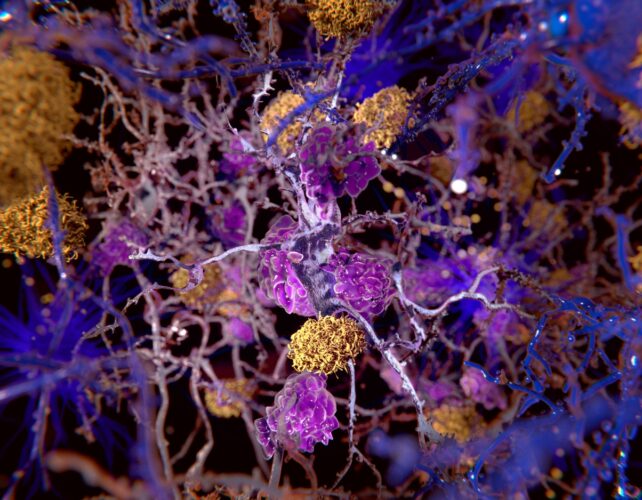There’s nonetheless a lot we do not learn about Alzheimer’s illness, however the hyperlink between poor sleep and worsening illness is one which researchers are exploring with gusto.
In a examine printed in 2023, scientists discovered that utilizing sleeping drugs to get some shut-eye may scale back the build-up of poisonous clumps of proteins in fluid that washes the mind clear each night time.
Researchers from Washington College in St. Louis discovered individuals who took suvorexant, a typical therapy for insomnia, for 2 nights at a sleep clinic skilled a slight drop in two proteins, amyloid-beta and tau, that pile up in Alzheimer’s illness.
Although solely quick and involving a small group of wholesome adults, the examine is an fascinating demonstration of the hyperlink between sleep and the molecular markers of Alzheimer’s illness.
Sleep disturbances might be an early warning signal of Alzheimer’s illness that precedes different signs, comparable to reminiscence loss and cognitive decline. And by the point the primary signs develop, ranges of irregular amyloid-beta are virtually peaking, forming clumps known as plaques that clog up mind cells.

Researchers suppose selling sleep may very well be one avenue to stave off Alzheimer’s illness, by permitting the sleeping mind to flush itself of leftover proteins and the day’s different waste merchandise.
Whereas sleeping drugs might assist in that regard, “it will be untimely for people who find themselves apprehensive about growing Alzheimer’s to interpret it as a purpose to begin taking suvorexant each night time,” stated neurologist Brendan Lucey, of Washington College’s Sleep Drugs Middle, who led the analysis.
The examine spanned simply two nights and concerned 38 middle-aged members who confirmed no indicators of cognitive impairment and had no sleep points.
Utilizing sleeping drugs for extended durations is not a perfect resolution for these quick on sleep both, because it’s fairly simple to grow to be depending on them.
Sleeping drugs can also lull folks into shallower bouts of sleep moderately than deep sleep phases. This may very well be problematic as earlier analysis from Lucey and colleagues discovered a hyperlink between much less good high quality, slow-wave sleep and elevated ranges of tau tangles and amyloid-beta protein.
Of their newest examine, Lucey and colleagues needed to see if enhancing sleep with the help of sleeping drugs may decrease ranges of tau and amyloid-beta within the cerebrospinal fluid that bathes the mind and spinal twine. Previous analysis reveals that even simply one night time of disrupted sleep can ship amyloid-beta ranges rising.

A gaggle of volunteers aged 45 to 65 years outdated acquired one in every of two doses of suvorexant or a placebo tablet, an hour after researchers tapped their cerebrospinal fluid to gather a small pattern.
The researchers continued to gather samples each two hours for 36 hours whereas the members slept and through the subsequent day and night time, to measure how protein ranges modified.
There have been no variations in sleep between the teams, and but amyloid-beta concentrations had been lowered by between 10 and 20 % with a dose of suvorexant normally prescribed for insomnia, in comparison with a placebo.
The upper dose of suvorexant additionally momentarily lowered ranges of hyperphosphorylated tau, a modified type of the tau protein linked to the formation of tau tangles and cell demise.
Nevertheless, this impact was solely seen with some types of tau, and tau concentrations sprung again up inside 24 hours of taking the sleeping tablet.
“If you happen to can scale back tau phosphorylation, probably there can be much less tangle formation and fewer neuronal demise,” stated Lucey, nonetheless hopeful that future research in older adults testing sleeping drugs for months may probably measure a long-lasting impact on protein ranges (while noting any downsides of sleeping drugs).
In fact, this all rests on our understanding of what causes Alzheimer’s illness.
The main idea, that irregular protein clumps drive Alzheimer’s pathology, has come underneath intense scrutiny these days after a long time of analysis aimed toward reducing amyloid ranges has not translated into any helpful drug or remedy that truly prevents or slows the illness. This has prompted researchers to rethink how Alzheimer’s illness develops.
In different phrases, sleeping drugs might assist some folks get some shut-eye however utilizing them as a preventative therapy to thrust back Alzheimer’s illness remains to be a hazy prospect that hangs on a now-shaky speculation of Alzheimer’s pathology.
That stated, there may be growing proof linking sleep disturbances to Alzheimer’s illness, a illness for which no therapies exist. Lucey says enhancing sleep hygiene and looking for therapy for sleep issues comparable to sleep apnea are each smart approaches to enhancing basic mind well being at any age.
“I am hopeful that we are going to ultimately develop medication that benefit from the hyperlink between sleep and Alzheimer’s to stop cognitive decline,” stated Lucey. However he admitted, “We’re not fairly there but.”
The examine was printed in Annals of Neurology.
An earlier model of this text was printed in April 2023.
